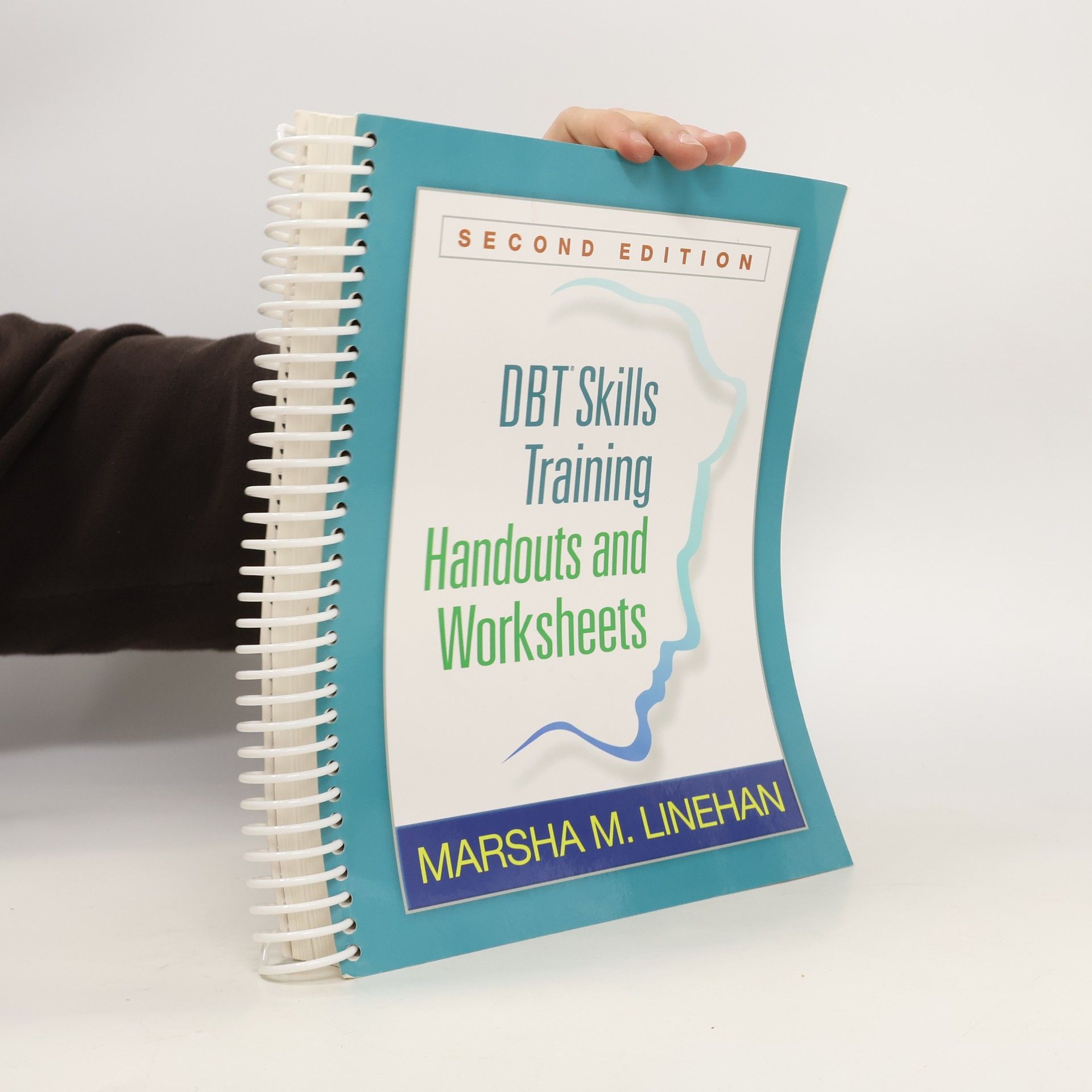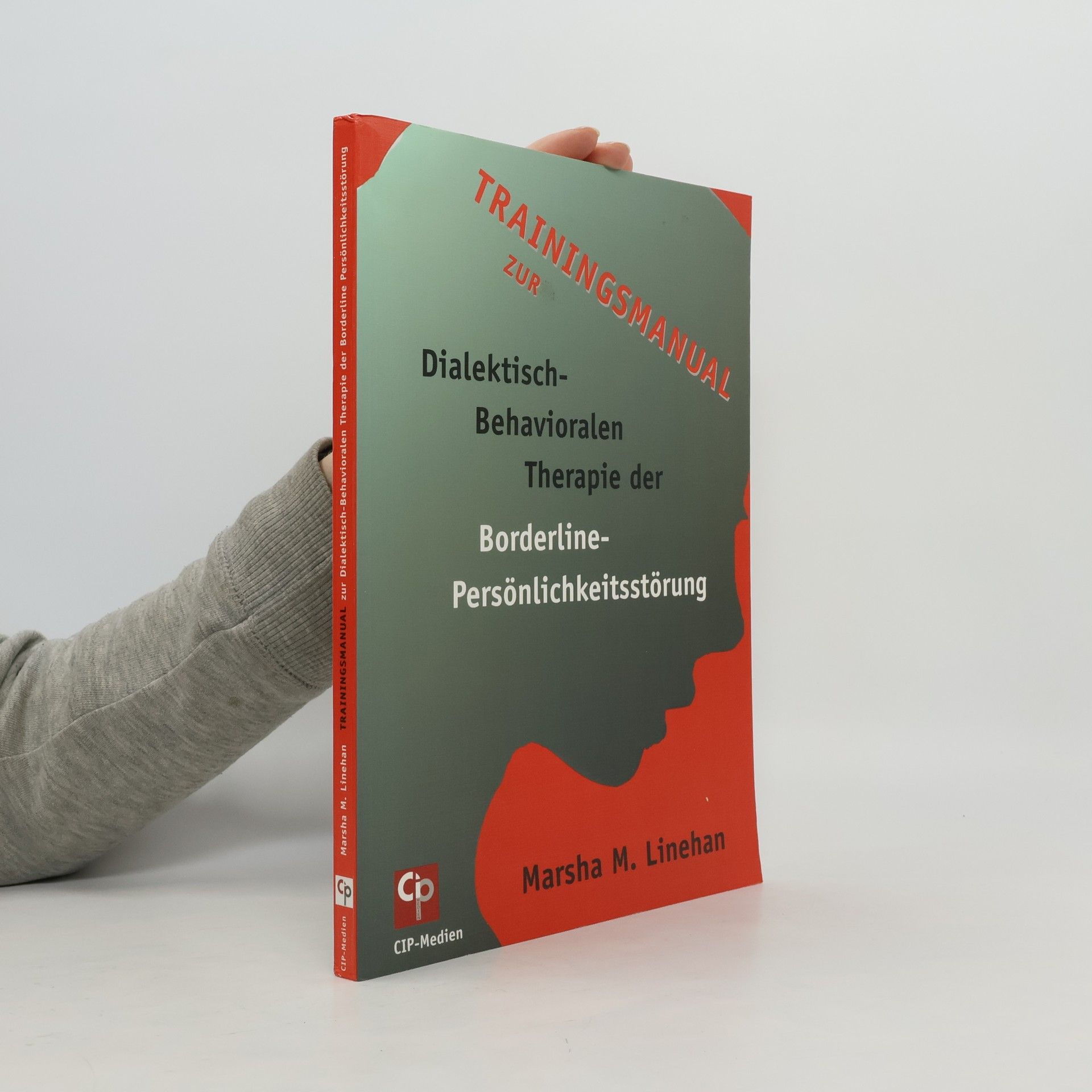Dialektisch-Behaviorale Therapie (DBT) ist eine bedeutende Entwicklung in der Psychotherapie, ursprünglich für suizidale und Borderline-Patienten konzipiert, mittlerweile jedoch ein umfassender Ansatz für alle psychischen Störungen. Das Trainingsmanual hat sich zu einem vollständigen Lehr- und Praxisbuch entwickelt, das alles Notwendige für eine effektive Psychotherapie bietet, einschließlich störungsspezifischer Interventionen. DBT behandelt nicht nur Persönlichkeitsstörungen, sondern auch Achse-I-Störungen wie Depression, Angst, Zwang, Bulimie, Anorexie, Dissoziation, Suizidalität, Sucht, Trauma und ADHS. Der Fokus liegt auf dem Menschen, nicht nur auf der Störung. Das Buch bietet eine Fülle an Tools zu Achtsamkeit, Emotionsregulation, Selbstberuhigung, Stressbewältigung, Kommunikation und Krisenbewältigung. Der begleitende zweite Band ist ein Arbeitsbuch für Therapeuten und Patienten, das eine reichhaltige Sammlung von Therapiematerialien enthält, die mit dem DBT Skills Training Manual abgestimmt sind. Es ermöglicht auch ohne spezielle DBT-Ausbildung, von diesem Konzept zu profitieren. Neben bewährten dialektischen Strategien sind neue, effektive Interventionen enthalten, die die Kreativität und Effektivität in der Therapie fördern. Marsha Linehan begleitet sowohl unerfahrene als auch erfahrene Psychotherapeuten durch herausfordernde Therapiephasen. Das DBT Handbuch ist somit ein unverzichtbares Werkzeug für jede psychother
Marsha M. Linehan Bücher
Marsha Linehan ist eine renommierte Professorin und Pionierin in der Behandlung schwerer psychischer Belastungen, insbesondere suizidalen Verhaltens und Borderline-Persönlichkeitsstörungen. Ihre lebenslange Arbeit widmet sich der Entwicklung und Validierung evidenzbasierter therapeutischer Ansätze, die nachweislich Selbstverletzung reduzieren und die emotionale Regulation verbessern. Über ihre umfangreichen akademischen und Forschungsbeiträge hinaus hat sie Organisationen gegründet, die sich der Verbreitung dieser lebensrettenden Behandlungen in die klinische Praxis und das öffentliche Bewusstsein verschrieben haben. Ihr Ansatz, der unter anderem durch den Zen-Buddhismus inspiriert ist, betont praktische Fähigkeiten und wissenschaftliche Wirksamkeit bei der Unterstützung von Menschen mit tiefgreifenden psychischen Problemen.






Weltweit anerkannt und verbreitet! - Das wichtigste Therapiebuch für Borderline-Störungen - Das umfassendste Verständnis der Psyche der Borderline-Persönlichkeit - Die exzellenteste Beziehungsarbeit - Die besten und wirksamsten Therapiestrategien - Das Ergebnis 20-jähriger Entwicklung des dialektischen Therapieansatzes - Mit wissenschaftlichen Nachweisen der therapeutischen Wirksamkeit Es setzt unverrückbare Maßstäbe psychotherapeutischer Kompetenz, ist aber in erster Linie die wertvollste Hilfe im therapeutischen Umgang und in der Begegnung mit Borderline-Patienten - aber auch für alle Situationen mit anderen Patienten, in denen intensive Emotionen zu handhaben sind.
Featuring more than 225 user-friendly handouts and worksheets, this is an essential resource for clients learning dialectical behavior therapy (DBT) skills, and those who treat them. All of the handouts and worksheets discussed in Marsha M. Linehan's DBT® Skills Training Manual, Second Edition , are provided, together with brief introductions to each module written expressly for clients. Originally developed to treat borderline personality disorder, DBT has been demonstrated effective in treatment of a wide range of psychological and emotional problems. No single skills training program will include all of the handouts and worksheets in this book; clients get quick, easy access to the tools recommended to meet their particular needs. The 8 1/2" x 11" format and spiral binding facilitate photocopying. Purchasers also get access to a Web page where they can download and print additional copies of the handouts and worksheets.Mental health professionals, see also the author's DBT® Skills Training Manual, Second Edition, which provides complete instructions for teaching the skills. Also available: Cognitive-Behavioral Treatment of Borderline Personality Disorder , the authoritative presentation of DBT, and Linehan's instructive skills training videos for clients-- Crisis Survival Skills: Part One, Crisis Survival Skills: Part Two, From Suffering to Freedom, This One Moment , and Opposite Action .
Coping with Cancer
- 140 Seiten
- 5 Lesestunden
This compassionate book presents dialectical behavior therapy (DBT), a proven psychological intervention that Marsha M. Linehan developed specifically for the impossible situations of life--and which she and Elizabeth Cohn Stuntz now apply to the unique challenges of cancer for the first time. *How can you face the fear, sadness, and anger without being paralyzed by them? *Is it possible to hold on to hope without being in denial? *How can you nurture supportive relationships when you have barely enough energy to take care of yourself? Learn powerful DBT skills that can help you make difficult treatment decisions, manage overwhelming emotions, speak up for your needs, and tolerate distress. The stories and collective wisdom of other cancer patients and survivors illustrate the coping skills and show how you can live meaningfully, even during the darkest days.
"Over the years, DBT had saved the lives of countless people fighting depression and suicidal thoughts, but Linehan had never revealed that her pioneering work was inspired by her own desperate struggles as a young woman. Only when she received this question did she finally decide to tell her story. In this remarkable and inspiring memoir, Linehan describes how, when she was eighteen years old, she began an abrupt downward spiral from popular teenager to suicidal young woman. After several miserable years in a psychiatric institute, Linehan made a vow that if she could get out of emotional hell, she would try to find a way to help others get out of hell too, and to build a life worth living. She went on to put herself through night school and college, living at a YWCA and often scraping together spare change to buy food. She went on to get her PhD in psychology, specializing in behavior therapy. In the 1980s, she achieved a breakthrough when she developed Dialectical Behavioral Therapy, a therapeutic approach that combines acceptance of the self and ways to change. Linehan included mindfulness as a key component in therapy treatment, along with original and specific life-skill techniques. She says, "You can't think yourself into new ways of acting; you can only act yourself into new ways of thinking.""
This volume examines the role of mindfulness principles and practices in a range of well-established cognitive and behavioral treatment approaches. Leading scientist-practitioners describe how their respective modalities incorporate such nontraditional themes as mindfulness, acceptance, values, spirituality, being in relationship, focusing on the present moment, and emotional deepening. Coverage includes acceptance and commitment therapy, dialectical behavior therapy, mindfulness-based cognitive therapy, integrative behavioral couple therapy, behavioral activation, and functional analytic psychotherapy. Contributors describe their clinical methods and goals, articulate their theoretical models, and examine similarities to and differences from other approaches.
From the developer of dialectical behavior therapy (DBT), this comprehensive resource offers essential tools for implementing DBT skills training. The revised and expanded teaching notes, handouts, and worksheets have been used by practitioners for over two decades and now reflect significant research and clinical advancements. The book includes complete instructions for orienting clients to DBT and teaching notes covering a full range of skills, including mindfulness, interpersonal effectiveness, emotion regulation, and distress tolerance. While handouts and worksheets are not included in the book, purchasers can access a webpage to download and print all discussed materials. This edition features completely revised handouts and worksheets, with over 225 available online and in the companion volume. Each module has been expanded with additional skills and multiple alternative worksheets to customize treatment for individual clients. The reproducible teaching notes are more extensive, including numerous clinical examples, and curricula for running skills training groups tailored to specific populations, such as adolescents and clients with substance use issues. Linehan also provides a concise overview of how to use the book effectively. For additional resources, see the companion volume and other related works by Linehan.
Una vita degna di essere vissuta
- 414 Seiten
- 15 Lesestunden
Manuál DBT
- 416 Seiten
- 15 Lesestunden
Tato kniha představuje základní materiál pro práci s klienty v rámci dialektické behaviorální terapie. Najdeme v ní více než 225 pracovních materiálů a listů, které lze použít pro práci s klienty. Autorka materiály vytvořila původně pro účely práce s lidmi s hraničním uspořádáním osobnosti a po revizi (předkládaná kniha představuje druhé, rozšířené vydání) je lze využít i pro lidi s jinými emočními a osobnostními obtížemi.


